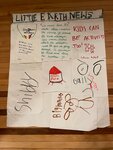
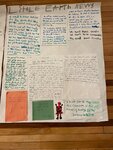
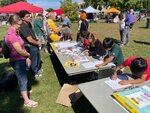
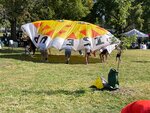
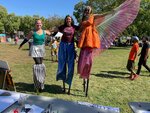


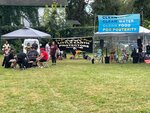
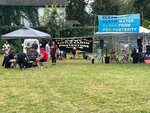
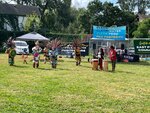
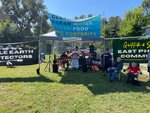
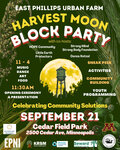
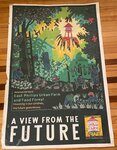
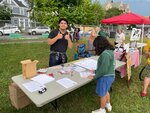
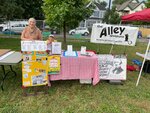
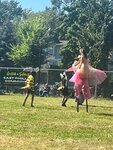
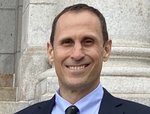
Good things take time. Look at the East Phillips community's struggle to win control of the Roof Depot site.
For a decade, a broad coalition of East Phillips neighbors and supporters have fought for the right to convert the vacant Roof Depot warehouse into a solar-powered, community-owned, indoor urban farm and community hub.
On Sept. 21 at Cedar Field Park in Little Earth, the community came together for the East Phillips Urban Farm – Harvest Moon Block Party, a celebration of community victories, voices, and solutions, including the incoming collective stewardship of the contested Roof Depot site.
The community saw community solutions in motion and learned about the upcoming renovation of the Roof Depot warehouse, as East Phillips Neighborhood Institute (EPNI) and community partners continue building toward the long-fostered East Phillips Urban Farm vision.
All were welcome to this free event, put on by and for the community. There was food, presentations, live muraling, drum circles, Aztec dancing, and plenty of activities for kids and adults, including the creation of a community newspaper called Little Earth News.
Cassie Holmes, an EPNI board member and Little Earth community leader who works at the Indian Health Board, participated in the event and has been a key voice in the East Phillips community's Roof Depot struggle.
"Our community has had to fight for the basic human rights of clean air and clean water in an urban area," Holmes said during the October episode of "Youth Community Journalism" on making public health better. "When we first started, it was just community members coming together and recognizing that we were living in a very toxic, polluted community. … The knowledge wasn't out there, and it wasn't shared."
Holmes was born and raised in south Minneapolis and grew up in Little Earth of United Tribes. Like many community members, she didn't know the extent of harm with the arsenic triangle in East Phillips, the area at the northwest corner of 28th Street and Hiawatha Avenue that was heavily contaminated with arsenic due to past pesticide manufacturing activities.
"I didn't know that people in hazmat suits came and picked up over 600 homes and businesses, their dirt as deep as six feet under because it was so toxic," Holmes explained. "We talked about life. We heard about the life expectancy for Native Americans. Our elders are 55 because
our life expectancy isn't being an elder at 65. In our community, when our kids get asthma or have asthma attacks or diabetes or heart conditions, that was just kind of like life for us. That's just something that happened. But we're realizing that we were living in this polluted community."
Holmes lost a son who was 16 to a heart condition he wasn't born with. Her best friend lost a daughter to a heart condition she wasn't born with.
"We've lost lots of kids to asthma attacks, and now that we know what's going on and what was against us, I feel like having that knowledge, it's already better. The fact that we're fighting and coming together as one is already better, and it's going to take years. But with the community vision, I feel like we're going to be on a really good generational path of not only physical health but financial health and just better opportunities."
Little Earth and the East Phillips community continue to show what is possible. By turning toxic harm into an urban farm, they can be a model for community power.
That is what the East Phillips Urban Farm is all about. When everyone focuses on solutions, it's easy to envision a better future.
We need more of this kind of teamwork everywhere.
The East Phillips Urban Farm project is an example of people working together to preserve and strengthen a community. It is bigger than an urban farm. It is a movement to build a better future where everyone can grow and thrive. It is a movement for a fairer, healthier, and better world. A world that works for everyone.
The East Phillips Urban Farm is a view from the future. It is a food forest where no one goes hungry, no one goes without shelter, and everyone’s basic human needs are met. It’s a future where we invest in our children, where all future generations have the opportunity to prosper, and where we can live in peace with justice for all.
This view of the future is not an impossible dream. It is the vision of a world where the community decides what kind of community they want.
A few years ago, the city of Minneapolis received 1,063 comments from individuals and organizations opposed to expanding the public works facility into the Roof Depot site at Hiawatha and 28th. Only two were in favor of it.
The struggle to win full control of the Roof Depot site continues. EPNI needs more money to purchase the Roof Depot site and close the deal to make the East Phillips Urban Farm happen.
Power structures and systems do not like to give up their power.
But the power of the community is growing.
Watch the full "Youth Community Journalism" conversation with Cassie Holmes, Dr. Dziwe Ntaba, and Don't Shoot Guns Shoot Hoops founder and CEO Tommy McBrayer on how we make public health better at the Strong Mind Strong Body Foundation's YouTube channel.
Eric Ortiz lives in the Wedge with his family. He is executive director of the Strong Mind Strong Body Foundation, a national youth and community development nonprofit based in Minneapolis.
Comments
No comments on this item Please log in to comment by clicking here